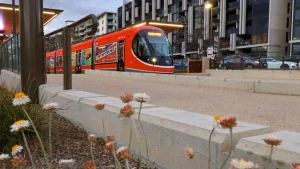Navigating historically male workplaces
In the lead up to International Women’s Day our Operations Manager, Antony Chilton-Murphy, reflected upon his experiences with Women in Rail (WiR). He first connected with the organisation when it launched in the UK more than a decade ago.
Antony was introduced to the WiR concept in 2012 by a colleague who knew the founder, Adeline Ginn MBE. He attended some of the group’s early gatherings but was surprised to find that becoming a mentor was harder than he had expected.
“I recall the events were usually small, informative daytime talks that were often hosted by rail operators,” Antony explained. “This helped to differentiate WiR within our sector, as back then it was pretty common practice for industry gatherings to happen in a pub or at large award ceremonies.
“In 2014 I took the next step by applying to join the WiR mentor scheme. The organisation was very supportive in connecting me with a mentee, but she was employed by a competitor so the business I worked for refused to let me engage with her! Remember this was ten years ago, thankfully attitudes to mentoring are more enlightened within the industry today.”
Layers of unconscious bias
Fast forward a few years and Antony joined another rail business where he reactivated his interest in mentoring. After applying to the scheme again he was put in touch with a WiR member who worked as an engineer.
“The start of our mentoring relationship coincided with the early COVID period, so we would speak every few weeks without ever meeting in person. In fact, we never met face to face until just a few weeks ago when we arranged to attend a WiR event in London.
“Our conversations usually focused upon how she navigated her role within a large, complex organisation. We would explore strategies for overcoming entrenched ways of operating, as she faced layers of unconscious bias that were inevitable in a male dominated business.
“Together we would anticipate the ‘how and why’ of colleagues’ reactions to her in certain situations, particularly meetings with challenging individuals, and identify effective responses. We would discuss why certain people might behave towards her in different ways, particularly in their communication behaviours, and come up with tactics to mitigate that.
“I remember lengthy conversations about how to call out inappropriate behaviour without disrupting the business process that was being undertaken – this was about career progression after all. It is interesting to note that we rarely talked about rail. She encountered roadblocks that were typical to large, historically male workplaces and were generally not specific to the rail industry.”
Learning to listen
Antony’s WiR mentee achieved considerable success as a senior figure in her organisation, and the two of them still speak regularly. With this in mind, what has he learned from the experience of being a long-term mentor?
“The process of being a WiR mentor has been very professional and structured. It is a thought-provoking, enriching experience and is absolutely not the mentor simply giving information and the mentee receiving it. I’ve learned to listen more which has been very valuable for me personally.
“I’ve certainly changed my own approach to communicating with people as a result of the WiR scheme. Mentoring is a mutually beneficial relationship and not a one-way street, in fact we joke about which one of us is really the mentor. The dedication and extra effort she put into her career made a big impact upon me.
“I have learned so much about communication from our conversations – I frequently take her ideas and implement them within my own role. For example, we recently discussed strategies she uses to confront issues and achieve collaborative outcomes in large organisations. My colleague Aleksandra Los also finds it necessary to navigate complex relationships in her client-facing role at TTG, so I have applied learnings from my mentoring experience to support Aleksandra in her work.”
An exciting future relationship
So what does the future hold for Antony’s connection to WiR?
“This year’s Internation Women’s Day comes at an exciting time for me personally, as WiR are about to connect me with my new mentee. I am invigorated by the prospect of exploring professional perspectives and experiences together, and discovering where they will lead us.
“Looking at WiR more broadly, I anticipate seeing the organisation keep its foot on the pedal as it progresses female participation across our industry. None of us can sit back and assume change will happen organically, we all have a responsibility to remain energetic and diligent.
“I enjoyed the recent WiR event in London with Slyvia Baldock presenting her tips on being significant within your workplace. It was so engaging and participative. Unfortunately, I was one of just a handful of men among 150 attendees. I recall wishing there could been another twenty or thirty of us, as we would have all learned a lot!”
Want to know more about TTG and the benefits of implementing our DAS solution? Contact our team today to start the conversation.



